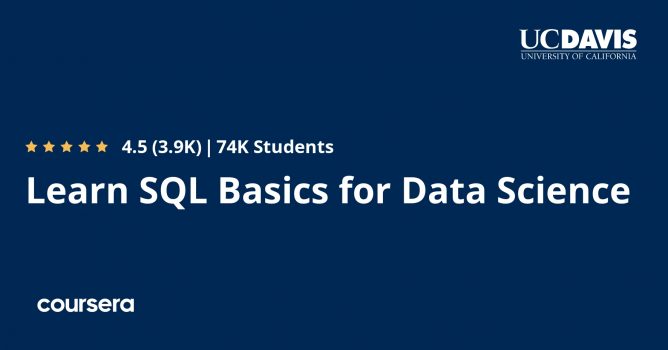Topics Covered:
-
Use SQL commands to filter, sort, & summarize data; manipulate strings, dates, & numerical data from different sources for analysis
-
Assess and create datasets to solve your business questions and problems using SQL
-
Use the collaborative Databricks workspace and create an end-to-end pipeline that reads data, transforms it, and saves the result
-
Develop a project proposal & select your data, perform statistical analysis & develop metrics, and present your findings & make recommendations
What you will learn in this specialization course
- SQL for Data Science Course : This course is designed to give you a primer in the fundamentals of SQL and working with data so that you can begin analyzing it for data science purposes. You will begin to ask the right questions and come up with good answers to deliver valuable insights for your organization. This course starts with the basics and assumes you do not have any knowledge or skills in SQL. It will build on that foundation and gradually have you write both simple and complex queries to help you select data from tables. You’ll start to work with different types of data like strings and numbers and discuss methods to filter and pare down your results.
- Data Wrangling, Analysis and AB Testing with SQL Course : This course allows you to apply the SQL skills taught in “SQL for Data Science” to four increasingly complex and authentic data science inquiry case studies. We’ll learn how to convert timestamps of all types to common formats and perform date/time calculations. We’ll select and perform the optimal JOIN for a data science inquiry and clean data within an analysis dataset by deduping, running quality checks, backfilling, and handling nulls. We’ll learn how to segment and analyze data per segment using windowing functions and use case statements to execute conditional logic to address a data science inquiry. We’ll also describe how to convert a query into a scheduled job and how to insert data into a date partition. Finally, given a predictive analysis need, we’ll engineer a feature from raw data using the tools and skills we’ve built over the course. The real-world application of these skills will give you the framework for performing the analysis of an AB test.
- Distributed Computing with Spark SQL : This course is for students with SQL experience and now want to take the next step in gaining familiarity with distributed computing using Spark. Students will gain an understanding of when to use Spark and how Spark as an engine uniquely combines Data and AI technologies at scale. The four modules build on one another and by the end of the course the student will understand: Spark architecture, Spark DataFrame, optimizing reading/writing data, and how to build a machine learning model. The first module will introduce Spark, including how Spark works with distributed computing and what are Spark Dataframes. Module 2 covers the core concepts of Spark such as storage vs. computing, caching, partitions and Spark UI. The third module looks at Engineering Data Pipelines covering connecting to databases, schemas and type, file formats and writing good data. The final module looks at the application of Spark with Machine Learning through the business use case, a short introduction to what machine learning is, building and applying models and a final course conclusion.
- SQL for Data Science Capstone Project : Whether you have successfully completed the other courses in the Learn SQL Basics for Data Science Specialization or are taking just this course, this project is your chance to apply the knowledge and skills you have acquired to practice important SQL querying and solve problems with data. You will participate in your own personal or professional journey to create a portfolio-worthy piece from start to finish. You will choose a dataset and develop a project proposal. You will explore your data and perform some initial statistics you have learned through this specialization. You will uncover analytics for qualitative data and consider new metrics that make sense from the patterns that surface in your analysis.
Course Rating : 4.5
Instructors : Sadie St. Lawrence, and 4+
Offered By :University of California, Davis
Can I download Learn SQL Basics for Data Science Specialization course?
You can download videos for offline viewing in the Android/iOS app. When course instructors enable the downloading feature for lectures of the course, then it can be downloaded for offline viewing on a desktop.Can I get a certificate after completing the course?
Yes, upon successful completion of the course, learners will get the course e-Certification from the course provider. The Learn SQL Basics for Data Science Specialization course certification is a proof that you completed and passed the course. You can download it, attach it to your resume, share it through social media.Are there any other coupons available for this course?
You can check out for more Udemy coupons @ www.coursecouponclub.comDisclosure: This post may contain affiliate links and we may get small commission if you make a purchase. Read more about Affiliate disclosure here.



